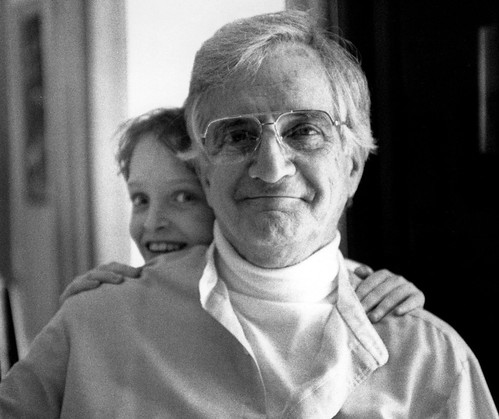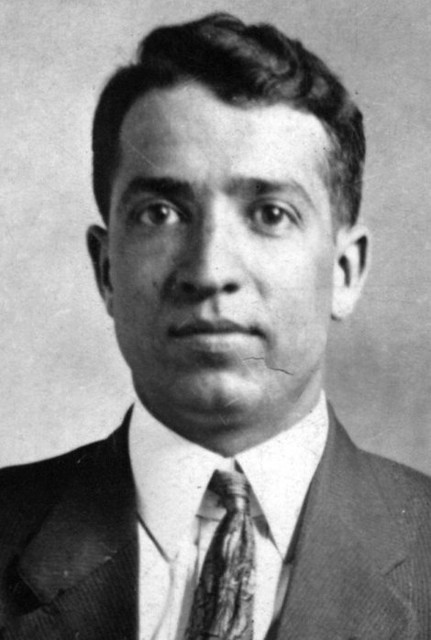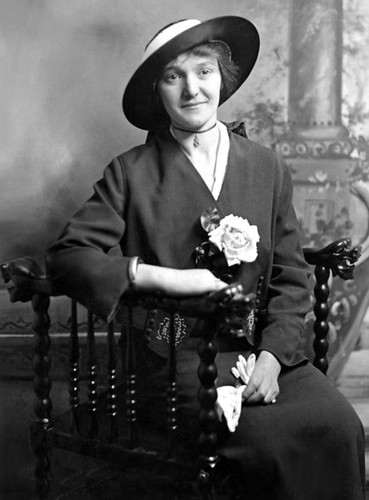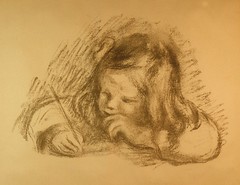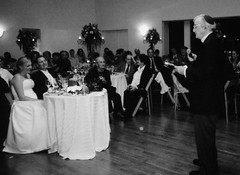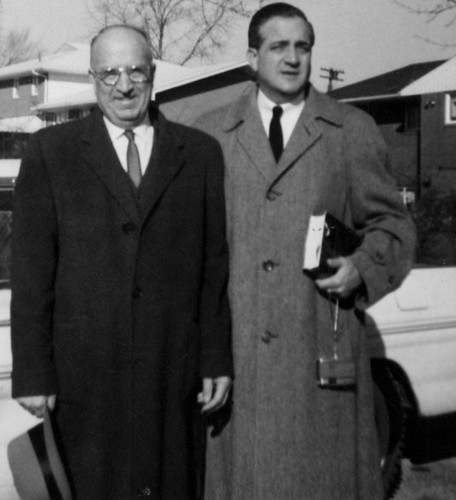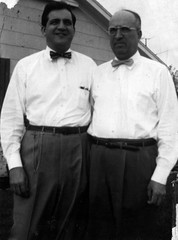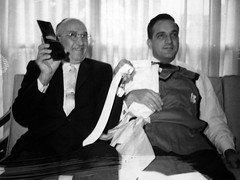I first met Nate in 1944 in Papua New Guinea where I was a GMO(general medical officer with the 102nd Station Hospital. I was never very busy, so, when Nate, the flight surgeon from the nearby air base, invited me to go with him to check for medical problems at the native village, I was ready to go. Nate (Capt. Nathan Shlimovitz, later shortened to Shlim) took penicillin from the base dispensary to give to native children infected with yaws and to men with venereal disease. He had been there before; the natives were glad to see him and readily lined up for their penicillin. He was patient and never displayed any anger; he was always in a good humor. I enjoyed being with him.
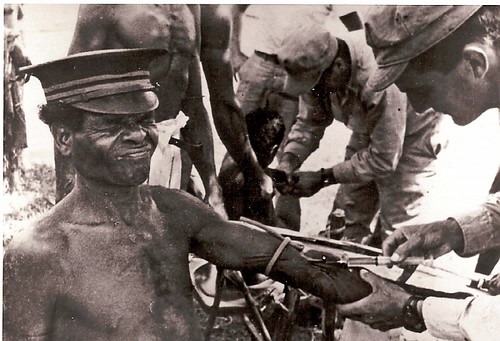
When the war moved north, the 102nd closed down and we were absorbed into the 35th General Hospital at Lae. There I became a dermatologist; there was no challenge, so I volunteered for the Alamo Scouts. Now I found myself at the southern tip of Leyte in the Philippines as the medical officer for a unit devoted to gathering intelligence for the 6th Army. There was little to do; the officers and support personnel were in exceptionally good mental and physical shape.
After three months with the Scouts, I was transferred to the 58th Evac Hospital on another Philippine island, Cebu. The commanding officer sent me to the operating area to put the injured to sleep for surgeons to work on. It was all new to me and I enjoyed it immensely. I was never bored.
The next stop was Luzon where I ate, slept, read, and played volleyball; ten days after the armistice we landed by navy cruiser at Yokohama to set up our hospital. Now it was boring again; it helped that I explored bombed out, burned out Tokyo and went part way up Mt. Fuji. The truly exciting event was getting orders to go home. Yvette and 18 month old Fuzz met me at the railroad station in New Orleans on the morning of November 25th, 1945.

Back in the States, I began my postgraduate training with a residency in tuberculosis at Cleveland City Hospital in April 1946. I hoped that if my performance were good I would get a recommendation from the chief of the service that would improve my chances of getting a residency in internal medicine at the same hospital. I kept up my interest in internal medicine by attending rounds and lectures on internal medicine. One evening I went to a lecture at the Lakeside Hospital by Harry Goldblatt, a world-famous researcher on hypertension. I was a bit late and had to stand at the top row of the amphitheatre.
When the lecture was over and the crowd began to clear, I was surprised to see Nate across the hall. I went over to greet him and find what he was doing at the lecture. He was glad to see me, but all was not well. He was a resident in surgery and he and his wife, Sylvia, and infant, Harriet, had been renting a house near the hospital. Without warning, the owners had returned and demanded they leave. Nate had been struggling to find another place to live. If he failed, Sylvia and the baby would have to return to Chicago; he would be alone in Cleveland. I told him I would see what I could do. I was not optimistic because Yvette and I had experienced the same scenario—we had rented a home in the middle class section of Cleveland, and when the owners decided to cut their vacation short and wanted the house back, we had had to scramble to find a another place to live; luckily a slum apartment near the hospital opened up—we were glad to get it.
When I returned home after the lecture, I told Yvette of meeting Nate and hearing his awful story. Yvette’s solution was simple: they should move into our apartment with us. They stayed with us for six weeks until they found a place for themselves. Our apartment was small, two bedrooms, a kitchen, part of which was the bathroom, no appliances except an old range with a useless oven. They moved in. When Nate and I went to our work in the morning, Yvette and Sylvia cleaned up, tended to Richard and Harriet, all the while chatting like old friends. During the six weeks that we lived together we got along famously, nary an unkind word or disagreement. It helped that Sylvia was a gourmet cook.
We kept in touch. After the Shlims settled in Portland, Oregon, and we in Houston, we traveled with them to San Francisco and northern California. We visited them when we joined a group that left from Portland to go to China in 1977. And they surprised Yvette by showing up at her 70th birthday party in 1987. Being with them was fun though it was marred by Sylvia’s endless complaining that Nate insisted on buying apartment buildings and turned them over to her to manage. Nate pooh-poohed her complaints and continued to invest in apartment buildings.

Naturally, we asked about their children: Harriet was the infant who had lived with us for six weeks in Cleveland. They never talked about her. The second child was David, a physician. When we asked about him, both Nate and Sylvia mumbled something about a clinic in Katmandu, Nepal. That happened several times; the message was clear that they were not interested in talking about him. It was hard for Yvette and me to believe that the parents of a doctor would not want to talk about him, to boast about him.The youngest child was Larry who had hopes of breaking into the world of professional photography.
In 2009 Rob saw a note in the Smithsonian magazine announcing that David Shlim, M.D. had published a book. That night I phoned David, “David, this is Dr. Dan Jackson.”
There was a pause; then David began to chatter at a great rate. He remembered who I was. He had heard his parents talk about their experience in Cleveland in our apartment. He had given up the clinic at Katmandu and a job as an emergency room physician and had opened a solo practice near Jackson Hole, Wyoming. When I asked about his book, he explained: on one of his trips to Katmandu, a Buddhist priest had approached him and commented on the stress he saw in his face. He convinced David that he could help him. They began a series of conversations that lasted three years during which David learned about the need for compassion in his life. Over time he changed and was now much happier.
He had written a book about his experience,
Medicine and Compassion: it was for doctors and their patients. He sent me a copy and a snapshot of the priest who had changed his life. He had inscribed on the title page: “To Dr. Jackson, who showed compassion to my parents in their time of great need.” That was a lovely gesture by David to me and, of course, to Yvette. I was pleased that he had done so much for himself, had turned his life around. My curiosity was tweaked: what had happened to David that had created so much stress in his life? I had the feeling that his stress was a reflection of his anger, anger that he carried within himself and chose to ignore rather than face. There were hints of that in his book but until he had met the Buddhist priest, he had avoided facing the truth.
If I had been able to talk with his siblings, Harriet and Larry, I might have been able to learn something about David as he was growing up. I remembered that Harriet, the infant who had stayed with us in Cleveland, had appeared in Houston out of the blue to visit us. She was having trouble in her marriage. Oddly, Harriet gave no explanation why she had not talked with Sylvia or Nate about her troubles. The youngest of the three children, Larry, had been with us on the trip to China. He kept to himself and as far as we could see, he made no friends; he stuck to taking pictures. When we visited the Shlims in their home, Larry appeared only at meals. Was this the picture of a dysfunctional family?
It would have helped if I had sat Nate and Sylvia down, figuratively shaken them, and demanded, “I want to know about David, tell me about him.” Out of those conversations I might have gleaned enough information to make an informed guess why David had become so angry, so alienated from his parents. Of course, none of that was available to me.
My pop psychology led me to believe that the relationship of David to his parents held the answer to my question about his stress. Of the two I would choose Nate as the one to focus on—he was the more forceful, the more demanding of the two. Sylvia had already told us how he ignored her when she grumbled about his buying the apartment buildings and Nate, a surgeon, was a member of a culture that marked him as one to be obeyed and not questioned.
How did Nate impact David’s life? Did Nate make it known, openly or subtly, that he expected David to be a doctor? Was he disappointed and angry that David refused to go into further training to become a surgeon like himself? Did David feel Nate’s anger and leave home to escape the conflict over his training? We know he had little contact with his parents: he spent six months out of the year on the other side of the world to work pro bono in the clinic in Katmandu, Nepal; when he ran out of money, he came home to Portland to work as an emergency room doctor to replenish his funds to be able to return to Nepal and again work in the clinic. Being at odds with his father and in too much inner turmoil to settle into a stable medical practice, he could see that his life was going nowhere. How could he get out of this pit of despair, not necessarily to please his father, but even please himself? He hated himself; he had disappointed everybody, especially himself.
We cannot be certain that we know
why David had became so angry and stressed, but we do know that anger that is not dealt with leads to stress. It was fortunate that the Buddhist priest took it upon himself to point out that he could see on David’s face the reflection of the stress. David then embarked on conversations with him over the period of three years to learn about himself. He now feels better, is happy, likes himself, has learned that if he understands his anger, then he can understand others and be compassionate toward people around him. As a result of what he learned about himself, he spends only a small amount of his time as a physician. He travels,
lectures, and talks to doctors and their families about what he has learned about being compassionate, about what it has done for him, and what it can do for them.
David’s learning to be compassionate struck a familiar note with me. When I was in training I began to form an image of how I would conduct myself in the presence of patients. My first contact with a patient would be in my consultation room; there would be a desk between us. I would address patients as Mister and Misses. I probably wouldn’t smile much; it might not be too wise to be too friendly. I would hide my emotions. I wouldn’t let anything upset me; at least I wouldn’t let on if I were upset. It would be important not to let the patient get too close to me: I would not be the patient’s friend, I would be his doctor; I must avoid being both. If a patient invited me to lunch, I’d find an excuse not to accept; that might put him too close with me which would influence my feelings about him.
If a patient were angry, I wouldn’t question his behavior, if he wanted to tell me what was upsetting him, I would wait for him to explain. I wouldn’t try to get any information from him; he’d have to speak without any direction from me. If a patient were to cry, I would provide a tissue; it never occurred to me to say I was sorry that he or she was so unhappy. I would avoid smiling. I would stick to the matter at hand, no small talk. I wanted to be a good, competent physician but not be friends with my patients. I had no idea that patients needed my humanity more than my examination and a prescription.
As time passed I sensed I needed to change. With help I learned that my patients wanted to talk and if I were quiet and were willing to let them talk, that would get me a lot of information. It would let patients know that I would listen to them and not ignore their feelings. I learned how it made a difference for me to see new patients in my examining room instead of my office. There would be no desk between us; they would sit on the examining table and I would sit on a stool and listen. I wanted to listen, to hear, to be a friendly ear as well as a professional one. I learned to care for my patients, I could call them by their first names, it would not hurt me to be close, and that really caring, being compassionate, would be good for both of us.
I don’t think I would be a happy physician in today’s practice; the patient is not allotted much time and my style of sitting and listening takes up a lot of time. If he takes up too much time, other patients will suffer or if they demand more time, I would have to extend my hours long after the usual 5:00 pm deadline. Most of all I would feel uncomfortable, knowing that I was shortchanging the patient, that I wasn’t giving him the time he needed to tell me all that was on his mind. I probably would retire completely from practice or find a desk job which I would hate. I’m lucky I retired before the changes in medical care occurred that would have forced me to make that decision. Now, instead of fighting a system of medical care that emphasizes speed and money, I read, I write, and I watch the squirrels and birds outside my study window. My medical life and my personal life have turned out well; I’m tickled pink.
